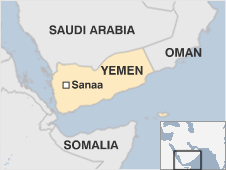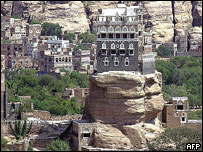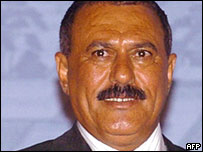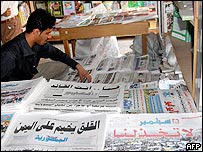 |
The reputed home of the Queen of Sheba, Yemen has been at the crossroads of Africa, the Middle East and Asia for thousands of years thanks to its position on the ancient spice routes.
The Romans knew this fertile and wealthy country as Arabia Felix, in contrast to the relatively barren Arabia Deserta to the north. And today it maintains its distinct character.
Overview
The modern Republic of Yemen was born in 1990 when traditionalist North Yemen and Marxist South Yemen merged after years of border wars and skirmishes. But the peace broke down in 1994 and a short civil war ended in defeat for separatist southerners and the survival of the unified Yemen.
AT-A-GLANCE
 Politics: President Ali Abdallah Saleh has been in power since 1978. Shia rebels led by Abdul-Malik al-Houthi have been conducting a low-level insurgency in the north
Economy: Yemen is the poorest country in the Middle East; economic difficulties have sparked unrest
International: Yemen has been co-operating in the US-led "war on terror", risking domestic resentment
|
Since unification Yemen has been modernising and opening up to the world, but it still maintains much of its tribal character and old ways. Tensions persist between the north and the south; some southerners say the northern part of the state is economically privileged.
Since the summer of 2009, hundreds have been killed and tens of thousands displaced by clashes between government troops and north-western rebels belonging to the Zaidi sect, a branch of Shia Islam in the mainly Sunni country. The conflict has acquired a regional dimension, with the Yemeni authorities accusing Iran of backing the rebels, while the rebels accuse Saudi Arabia of supporting the Yemeni government.
People wear traditional dress and the custom of chewing the narcotic plant khat in the afternoons is still widely observed. Yemen has attracted the curiosity of a growing number of tourists, although foreigners have been kidnapped by groups seeking to force concessions from the authorities.
The scene of attacks on a US warship and a French tanker, Yemen has gained a reputation as a haven for Islamic miltants. The authorities have arrested suspected al-Qaeda members and the US has supplied equipment and training for Yemen's security forces.
Thousands of illegal immigrants from Africa, including many Somalis, use Yemen as a staging post for the oil-rich Arab Gulf or Europe.
Facts
- Full name: Republic of Yemen
- Population: 23.6 million (UN, 2009)
- Capital: Sanaa
- Area: 536,869 sq km (207,286 sq miles)
- Major language: Arabic
- Major religion: Islam
- Life expectancy: 61 years (men), 64 years (women) (UN)
- Monetary unit: 1 Yemeni riyal = 100 fils
- Main exports: Crude oil, cotton, coffee, fish
- GNI per capita: US $950 (World Bank, 2008)
- Internet domain: .ye
- International dialling code: 967
Leaders
President: Ali Abdallah Saleh
Ali Abdallah Saleh, Yemen's longest-serving leader in recent times, was re-elected to another seven-year term in September 2006. It was the first time Mr Saleh had faced a serious challenge since coming to power 28 years earlier.

Yemen under President Saleh joined the US-led "war on terror"
|
The opposition cried foul but international monitors said the vote was fair.
Mr Saleh became president of the new republic created by the merger of the two Yemens in 1990. He had led the Yemen Arab Republic - the northern part of present-day Yemen - since 1978 when he came to power in a military coup.
He is backed by the main pillars of power in Yemen, the tribe and the army.
He won the first-ever direct presidential elections in 1999 with more than 96% of the vote. The main opposition party, which was barred from fielding a candidate, described the poll as a sham.
President Saleh's government has cooperated with the US in its "war on terror" and has settled border disputes with its neighbours, Saudi Arabia and Oman.
He joined the army when he was 16 and rose through the ranks to become field marshal.
Media
The Ministry of Information administers all broadcasting through the Public Corporation for Radio and Television.

The Yemeni press is strictly controlled
|
It controls most printing presses and funds some newspapers. The press is strictly controlled and newspapers have often been prosecuted over political articles.
Paris-based Reporters Without Borders said 12 opposition or independent journalists were arrested in 2007. Others were attacked in the street, it said.
TV and radio are vital news sources, given that illiteracy is widespread. Stations from Oman and Saudi Arabia can be picked up.
Around 320,000 Yemenis are online (ITU, March 2008). According to the OpenNet Initiative, which monitors internet censorship, internet filtering is "relatively broad in scope".
The press
- Al-Thawrah - official, daily
- Yemen Times - weekly, English-language
- Yemen Observer - weekly, English-language
- Al-Ayyam - private, daily
Television
- Republic of Yemen Television - state-run, operates Channel One from Sanaa and Channel Two from Aden
Radio
- Republic of Yemen Radio - state-run, operates the General programme from Sanaa, and the Second programme from Aden
News agency
-
Yemen News Agency (Saba) - state-run, English-language pages
AFRICA | ASIA-PACIFIC | AMERICAS | EUROPE | MIDDLEEAST | SOUTHASIA
Mauritania Mauritius Morocco Mozambique Namibia Niger Nigeria Republic-of-congo Rwanda Sao-tome-and-principe Senegal Seychelles Sierra-leone Somalia South-africa Sudan Swaziland Tanzania The-gambia Togo Tunisia Uganda zambia Zimbabwe Australia Brunei Burma Cambodia China East-timor Fiji Indonesia Japan Kazakhstan Kiribati Kyrgyzstan Laos Malaysia Marshall-islands Micronesia Mongolia Nauru New-zealand North-korea Palau Papua-new-guinea Samoa Singapore Solomon-islands South-korea Taiwan Tajikistan Thailand The-philippines Tonga Turkmenistan Tuvalu Uzbekistan Vanuatu Vietnam Antigua-and-barbuda Argentina Bahamas Barbados Belize Bolivia Brazil Canada Chile Colombia Costa-rica Cuba Dominica Dominican-republic Ecuador El-salvador Grenada Guatemala GuyanaHaiti Honduras Jamaica Mexico Nicaragua Panama Paraguay Peru St-kitts-and-nevis St-lucia St-vincent-and-the-grenadines Suriname Trinidad-and-tobago United-states-of-america Uruguay Venezuela Albania Andorra Armenia Austria Azerbaijan Belarus Belgium Bosnia-hercegovina Bulgaria Croatia Cyprus Czech-republic Denmark Estonia Finland France Georgia Germany Greece Hungary Iceland Ireland Italy Latvia Liechtenstein Lithuania Luxembourg Macedonia Malta Moldova Monaco Montenegro Norway Poland Portugal Russia San-marino Serbia Slovakia Slovenia Spain Sweden Switzerland The-netherlands Turkey Ukraine United-kingdom Vatican Algeria Egypt Iran Iraq Israel-and-palestinian-territories Jordan Kuwait Lebanon Libya Mauritania Oman Saudi-arabia Sudan Syria Tunisia United-arab-emirates Yemen Afghanistan Bangladesh Bhutan India Nepal Pakistan Sri-Lanka The-Maldives

